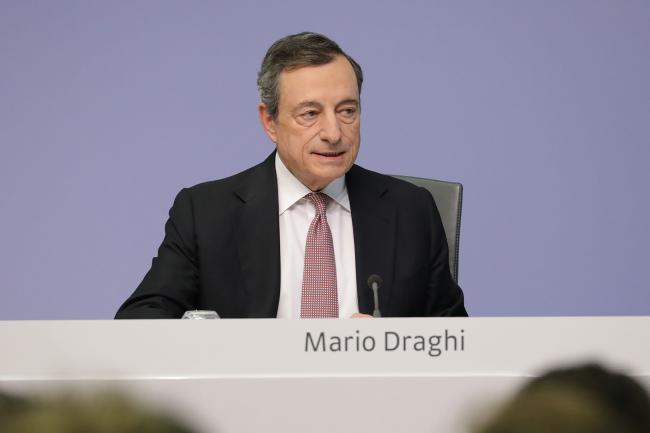(Bloomberg) -- Mario Draghi set the stage for a radical round of additional European Central Bank easing to combat the euro area’s severe economic slowdown.
While there are still signs of strength in the economy,“this outlook is getting worse and worse,” the ECB president said in Frankfurt after the Governing Council met. “It’s getting worse and worse in manufacturing, especially, and it’s getting worse and worse in those countries where manufacturing is very important. But because of value chains this propagates all over the euro zone. And so this must be taken into account.”
Draghi spoke hours after the latest data showed business confidence crumbling in Germany, the region’s largest economy. Survey data shows euro-area manufacturing is contracting, raising the prospect of a broad recession.
The council adjusted its pledge on interest rates -- already at record lows -- to signal that they could be cut further, and also it will restart its bond-buying program if needed. Draghi noted that consumer price growth remains well short of the ECB’s goal of just under 2%.
“On the inflation front, we don’t like what we are seeing,” he said. “That’s very important.”
The euro initially slid, before rebounding, and yields on German benchmark bonds fell to a record low.
The Governing Council added a key line to its statement clarifying its “commitment to symmetry” in the target, potentially emboldening policy makers to pursue monetary stimulus for longer. That reflects a willingness to possibly keep price growth elevated for a while after a period of weakness to ensure price growth is entrenched. Staff only recently started studying a revamp of the ECB’s specific aim.
“The Governing Council has tasked the relevant Eurosystem Committees with examining options, including ways to reinforce its forward guidance on policy rates, mitigating measures, such as the design of a tiered system for reserve remuneration, and options for the size and composition of potential new net asset purchases.”- ECB policy statement
The move comes as central banks around the world turn dovish suggesting monetary easing will soon be amplified. The U.S. Federal Reserve is widely expected to cut rates next week. Turkey delivered the biggest interest-rate cut in at least 17 years earlier Thursday. Australia’s central bank chief Philip Lowe said he’s ready to ease policy further if his back-to-back cuts fail to revive economic growth.
Risks from trade protectionism to Brexit are hitting economic confidence the world over, leaving the euro area’s export-focused economy particularly vulnerable. The ECB’s change of tack comes just months after it halted quantitative easing and started preparing to exit extraordinary stimulus. The U.S. Federal Reserve is expected to cut interest rates next week.
While Draghi argued that employment and wage growth are sources of resilience, he emphasized that significant stimulus is still needed. Economists surveyed by Bloomberg have predicted that policy makers will cut the deposit rate by 10 basis points in September, and announce a new round of QE starting in January, running throughout 2020.
What Bloomberg’s Economists Say
“Taken together, the wording of today’s decision and press conference strengthen our conviction that the ECB will deliver a meaningful dose of stimulus in September.”-- Maeva Cousin and Jamie Murray. See their ECB REACT
Bank shares rose after officials said they’re studying how to relieve lenders from some of the pains of negative rates by exempting some reserves. Banks have seen their profitability squeezed because of their struggle to pass the charge to customers. Draghi said that “if we are to lower interest rates that will come with mitigating measures.”
The ECB’s next meeting in September will be Draghi’s penultimate before his eight-year term ends and he hands over to former International Monetary Fund chief Christine Lagarde. That decision will be backed by updated macroeconomic projections.
“All this is pretty complex and needs preparation,” the president said. “We decided we wanted to see the next projections before taking action.”
